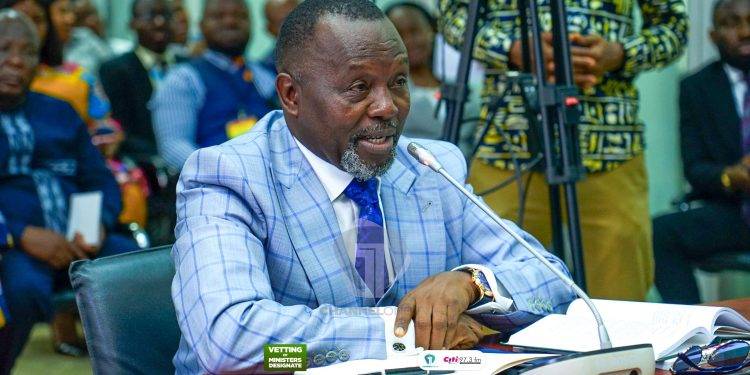Attorney General and Minister of Justice-designate, Dr. Dominic Ayine, has reiterated his commitment to ensuring that human rights violations do not occur under his watch. As part of his vision for decentralizing justice delivery in Ghana, he announced the reintroduction of a revamped public tribunal system, a key promise in the National Democratic Congress (NDC) 2024 manifesto.
Speaking before the Appointments Committee of Parliament during his vetting on January 13, 2025, Dr. Ayine addressed concerns raised in the Africa Watch Human Rights Report (Volume 4) regarding historical abuses associated with public tribunals. He assured the committee that any such misconduct would be strictly avoided under his leadership through comprehensive regulatory measures.
A New Era for Public Tribunals
Public tribunals, previously criticized for their susceptibility to political interference and unfair rulings, are set to make a comeback in a modernized form. Dr. Ayine outlined his proposal to draft and enact a Public Tribunal Court Act that would define the operations, jurisdiction, and limitations of these tribunals. This legislation, he emphasized, would be designed to eliminate the flaws of the past and ensure justice delivery is both efficient and fair.
“My proposal or my thinking going into this office is that we will enact a public tribunal’s Act that will be comprehensive and that will contain restrictions in terms of the conduct of the affairs of the tribunal,†he stated.
According to Dr. Ayine, the reintroduction of public tribunals aims to decentralize justice and bring legal services closer to citizens in every region. By doing so, the initiative seeks to address delays in court processes and improve access to justice for underprivileged communities.
Addressing Human Rights Concerns
Acknowledging the skepticism surrounding the return of public tribunals, Dr. Ayine was firm in his resolve to ensure transparency and accountability in their operations. He noted that the new system would adhere strictly to the principles enshrined in Ghana’s 1992 Constitution, particularly those related to human rights and the rule of law.
“We understand the history of public tribunals and the criticisms they attracted. That is why this administration will not take shortcuts. The aim is to decentralize justice, not to repeat past mistakes. I am committed to protecting the rights of every citizen,†he stated.
Lessons from History
Public tribunals were initially introduced as a mechanism to speed up justice delivery. However, over time, they became associated with abuses, such as arbitrary judgments and undue influence from political authorities. These criticisms led to their abolition, with calls for a more robust and independent justice system.
Dr. Ayine assured the committee that the mistakes of the past would serve as lessons for the future. He emphasized the importance of implementing checks and balances to prevent political interference and ensure that the tribunals operate within the confines of the law.
The proposed Public Tribunal Court Act will outline clear operational guidelines, including the appointment and training of tribunal officials, their jurisdiction, and the mechanisms for appeals.
Decentralizing Justice
One of the key motivations behind the reintroduction of public tribunals is the need to decentralize justice delivery. Ghana’s centralized court system has often been criticized for its inefficiency, with cases taking years to resolve. This has led to a backlog of cases, particularly in rural areas where access to courts is limited.
The new public tribunal system will aim to address these challenges by establishing regional and district-level tribunals. This approach, according to Dr. Ayine, will bring justice closer to the people and reduce the burden on traditional courts.
“Decentralization is not just about proximity; it’s about ensuring that every citizen, regardless of their location, can access timely and fair justice. Public tribunals will play a critical role in achieving this goal,†he noted.
Reaffirming Constitutional Principles
Dr. Ayine also emphasized the need to realign Ghana’s justice system with the principles of the 1992 Constitution. He pledged to uphold the rule of law and ensure that the reintroduced public tribunals respect the fundamental rights of all citizens.
He added that the tribunals would operate as independent bodies, free from political influence, and subject to oversight to ensure their compliance with constitutional provisions.
“We are not reinventing the wheel. We are building on the lessons of history and ensuring that our approach is guided by the Constitution and international best practices,†he said.
Stakeholder Engagement
Dr. Ayine called for stakeholder engagement in the drafting and implementation of the Public Tribunal Court Act. He noted that input from civil society organizations, legal practitioners, and human rights advocates would be crucial in shaping a system that is both effective and fair.
“Justice is not the preserve of government alone. It is a collective responsibility. We will work with all stakeholders to ensure that this initiative serves the best interests of the people,†he stated.
Public Response
The announcement of the reintroduction of public tribunals has sparked mixed reactions among Ghanai




George B Azungah
Jan 14, 2025I trust Hon Dr Ayine to deliver a good and just Legal System